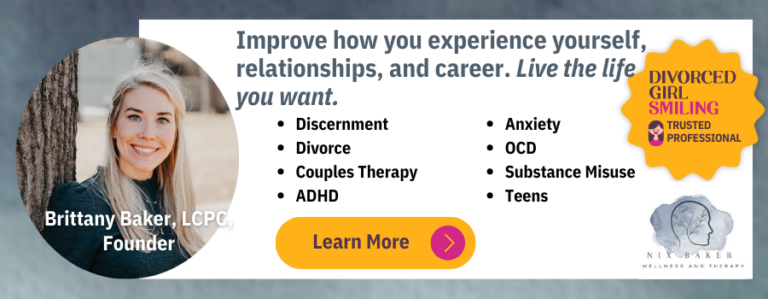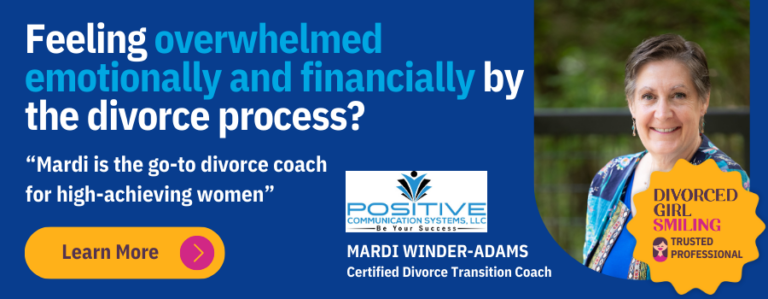When people think of abuse in a marriage or relationship, they tend to think of physical abuse-hitting, shoving, punching; hurting the victim’s body somehow. But there’s another kind of relationship abuse and it’s more difficult to see because there are no visible bruises: emotional abuse. A victim of emotional abuse sometimes doesn’t even realize he/she is a victim.
So, I’d like to offer signs to determine if you are a victim of emotional abuse, as well as some other information, including what to do if you realize you are.
I know a lot about emotional abuse, and I believe I was a victim of it in my marriage. That said, I’m not a therapist, and therefore I decided to interview one for this article.
This is my Q & A with Brittany Baker, LCSW, Therapist, Founder, Nix Baker Wellness and Therapy.
1. JP: What is emotional abuse?
BB: Emotional abuse is when an individual exerts control, creates fear, and isolates another through behaviors or interactions that belittle, criticize, humiliate, and manipulate. When emotional abuse occurs, one person uses emotions to gain power over another. It is one form of psychological abuse.
Emotional abuse comes in many forms, ranging from acts of controlling another (overt or covert), threatening, yelling, and name-calling to gaslighting, invalidating feelings or thoughts, or acting jealous. Emotional abuse can be direct comments to a partner or speaking poorly of them to others or online through social media. The aggressor engaging in severe and consistent martyrdom or threatening to harm themselves while blaming the other person’s feelings or behaviors can also be emotional abuse.
Unfortunately, emotional abuse can be overlooked or minimized because there aren’t external indications, like bruises, that one might expect in an abusive relationship. However, the comments, monitoring, manipulation, and fear of what will (or will not happen) create a trauma response in the survivor, significantly impacting their views of themselves and how they interact with the world.
Emotional abuse can happen independently of other abuse, but it is common to find emotional abuse as a gateway or coupled with other forms of abuse. It is important to note that frequency can be an element of emotional abuse. People have bad days and say things they do not mean, but emotional abuse will happen more than once and often escalates over time. You may also notice a pattern to the behaviors and conflicts, which is the cycle of abuse (Tension Building–> Incident ->Reconciliation (Honeymoon phase)–> calm).
2. JP: Is emotional abuse the same thing as mental abuse?
BB: Some people in the field use the terms interchangeably. They fall within the same category, psychological abuse, which tends to not include physical violence (though physical abuse may be threatened). Psychological abuse is generally coercive, manipulative, and disorienting to achieve control or power over another person.
There is a subtle difference between mental and emotional abuse. Mental abuse targets the survivor’s sense of reality and changes thoughts about oneself or the environment in ways that disempower an individual. In emotional abuse situations, the aggressor uses feelings to manipulate or create a sense of control over another. You find behaviors like gaslighting in both forms of psychological abuse.
3. JP: Why do people engage in emotional abuse?
BB: Emotional abuse is used to gain power and control over another. It can seem like the aggressor is just a bad person wanting to inflict pain on someone else. We often find that the perpetrator experienced emotional abuse or trauma growing up, watched this behavior modeled for them in childhood, or has formed a personality disorder or other mental health disorder for various reasons. This does not excuse any behavior, but it is a reality. It is always the aggressor’s responsibility to work on themselves to heal these wounds and show up differently for the people around them.
When the power balance tips heavily towards one partner, the benefiting partner may have the attention they desire, have their needs met regularly, reduce their own negative emotions, protect their ego, or create a distorted sense of safety for themselves. The more powerful partner does not feel they have to worry about being abandoned, rejected, or dismissed because their emotional abuse has impaired the survivor to the point where they “need” the relationship. If the aggressor feels threatened in the relationship, the emotional abuse can (and often will) escalate.
4. JP: What are some signs you might be a victim of emotional abuse?
BB: Many survivors experience:
-
- Decreased self-esteem and self-confidence
- Isolation from friends or family
- Being monitored in different ways or experiencing a loss of privacy
- Lacking independence or feeling controlled financially or emotionally
- Questioning your sense of reality, feeling that you are forgetting things often, or feeling as if you are going crazy
- Being called names, criticized, and talked poorly about to others
- Threatened with violence, suicide, separation, or telling others about your behavior
- Experiencing martyrdom and passive aggressiveness
- Depression, Anxiety, and/or Post Traumatic Stress Disorder Symptoms
- Increased substance use or misuse
- Constantly feeling as if they are defending the aggressor to others
- Accepting a lot of blame or experiencing a lot of guilt
5. JP: What action can you take if you think you might be a victim?
BB: I encourage survivors to reach out for help. This is the scariest and most challenging step. Many survivors have been threatened with violence, humiliation, smearing, abandonment, or judgment. When individuals are in the abuse cycle, they lose their sense of self and reality. The abuse often leads the survivors to believe they are not good, whole, or worthy and need the abuser in their lives. Survivors must remember the lack of self-worth or the feeling that they are “bad” is a function of the abuse cycle and not necessarily true.
When survivors can poke holes in the aggressor’s perspective of them, they can start to regain their power. We also have a term we use in some forms of therapy- “Behavioral Activation”. This is literally just taking a step forward, then taking another step…. The deliberate action can snowball into a healthier and safer situation. Reaching out for help or even researching where to turn for help could be that step that creates meaningful change.
According to the National Domestic Violence Hotline, those in abusive relationships return an average of 7 times before severing ties completely. Professionals (therapists, case managers, organizations, lawyers, financial advisors, doctors) can help someone take the necessary steps to leave. Survivors can also reach out to their support network. I caveat this by saying that not everyone will be part of the support system. Unlike physical abuse, there are no visible marks, and people may not understand or may discount the survivor’s experience. However, I have found that there may be friends, family, co-workers, or someone who noticed unusual behaviors but has been too nervous to speak up.
Every situation is different, and the risks of taking action will vary from person to person. I don’t want to pretend there are no safety or survival concerns when leaving an abusive situation. These are real and valid concerns, and appropriate cautions should be considered. However, the gains are life-changing for many.
6. JP: What would you tell a victim who has a family member who says, “It’s not abuse if he didn’t hit you?”
BB: This is tough. It is hard when a survivor is put in a position where they feel like they have to justify themselves or feel they are being judged. In some ways, it confirms what an aggressor has said and taps into the sense that their reality and emotions are invalid. It is not uncommon to hear this from family members or other support people.
Remember, emotional abuse is invisible in many ways. It can be challenging for an outsider to understand or believe, ESPECIALLY if the aggressor presents themself as charming, lovable, and honest. You are not responsible for convincing others, though. You are responsible for keeping yourself safe. It is okay to have boundaries with someone invalidating your experience. Don’t expect the boundaries to change someone else’s perspective or behavior. Boundaries are for you and are meant to keep you safe and protected physically and psychologically.
If a survivor feels the need to educate someone and is in a place psychologically to do so, they can send family members to reputable information pages about emotional abuse. The Nation Domestic Violence Hotline, Jamie Kimbel Foundation for Courage, Safe Horizons, and BWJP are a few options with good online information for support systems. Survivors can also educate themselves and plan conversations using statements like “I feel _____ because of _____”. Survivors may give guidance on what they need from their support systems as they figure out their next steps.
7. JP: How can a victim of emotional abuse heal?
BB: Survivors experience trauma responses and often have Depression, Anxiety, PTSD, low self-esteem, low sense of self-worth, and many other adverse impacts in various facets of life. I always recommend finding a good trauma-informed therapist to work through these challenges. There are also specific forms of therapy that are great in addressing traumatic experiences, such as EMDR. I also highly encourage survivors to find a community and support system where they feel heard, seen, and understood. There is power in numbers and knowing you are not alone.
I go back and forth on the idea of forgiveness… Our society often associates forgiveness with healing. I don’t know that it is necessary to heal. We don’t have to “forgive” someone for their terrible actions. Sometimes, the behaviors or words are downright unforgivable.
I often encourage trauma survivors to focus on how they relate to what they have been through. This can be in mindset or how their body reacts to triggers. We can’t change what has happened, and we can’t control someone else’s actions. However, our feelings, thoughts, and behaviors are within our control. You get to decide what the experience means to you, what meaning you can take from it, and how you integrate it into your sense of self in a way that empowers you. Remembering that helps to approach traumatic experiences from a resilient mindset.

As a seasoned therapist and founder of Nix Baker Wellness and Therapy, I am passionate about building a safe, supportive, individualized, and meaningful experience for clients. I want you to feel seen and understood. Therapy starts with creating a strong relationship, continues with building skills that work for your life and meet your needs, and evolves by integrating your past and present to recognize patterns in your life to create lasting positive change.
I am a Licensed Clinical Social Worker and an integrative therapist with over 10 years of experience. I draw from different modalities to create individualized treatment plans for each client. My expertise includes Cognitive Behavioral Therapy (CBT), Dialectical Behavior Therapy (DBT), Motivational Interviewing (MI), Emotion Focus Therapy (EFT), Attachment Therapy, Gottman Method, Solution Focused Therapy, Supportive Parenting for Anxious Childhood Emotions (SPACE), Executive Functioning Coaching, and Strength Based Therapy.
I have extensive experience working with diverse groups of people struggling with anxiety, depression, ADHD, traumatic events, life transitions, substance misuse/abuse, parenting issues, and relationship challenges. I attended the University of Texas at Austin as an undergraduate and completed the Master of Social Work Program at the University of Southern California. I received clinical training and practiced at high-quality teaching medical facilities in the Houston Area. I am a board-approved clinical supervisor for budding clinical social workers in Texas and Illinois, and I provide consultation for other clinicians on tough cases in their own practice.
I am a Texas girl transplanted to the midwest, still learning to survive the winters! I am a mom (human babies and fur babies), a wife, a daughter, a friend and a professional. I, too, work every day to balance it all, find meaning, and shake off the endless to-do list. In my spare time, you will find me outdoors (preferably in the heat) running or exploring a trail. If not outside, I am dreaming up new recipes, exercising, playing silly games with my two girls, or having a good laugh with my husband.






















